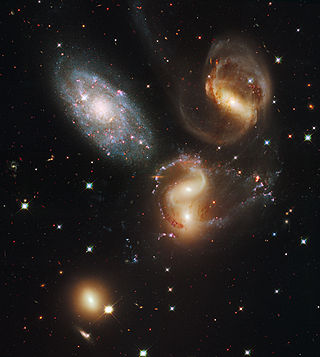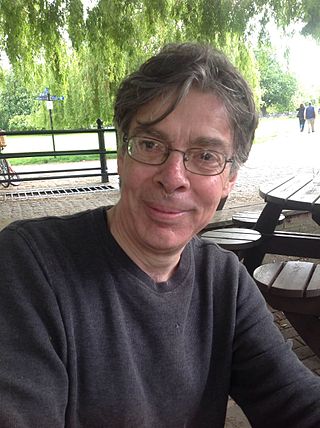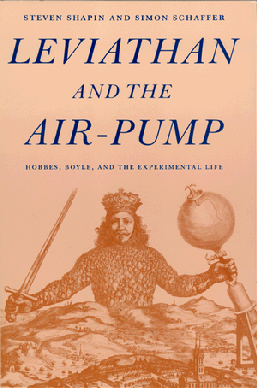Related Research Articles
Philosophy of science is a branch of philosophy concerned with the foundations, methods, and implications of science. The central questions of this study concern what qualifies as science, the reliability of scientific theories, and the ultimate purpose of science. This discipline overlaps with metaphysics, ontology, and epistemology, for example, when it explores the relationship between science and truth. Philosophy of science focuses on metaphysical, epistemic and semantic aspects of science. Ethical issues such as bioethics and scientific misconduct are often considered ethics or science studies rather than the philosophy of science.

Reality is the sum or aggregate of all that is real or existent within the universe, as opposed to that which is only imaginary, nonexistent or nonactual. The term is also used to refer to the ontological status of things, indicating their existence. In physical terms, reality is the totality of a system, known and unknown.
Consensus reality refers to the generally agreed-upon version of reality within a community or society, shaped by shared experiences and understandings. This understanding arises from the inherent differences in individual perspectives or subjectivities relating to knowledge or ontology, leading to uncertainties about what is real. While various viewpoints exist, people strive to establish a consensus, serving as a pragmatic guide for social norms. The term carries both positive and negative connotations, as it is viewed critically by anti-realist theorists but recognized for its practical benefits in fostering shared beliefs. Consensus reality differs from consensual reality, with the former representing mutual agreement about what is true. Artists and thinkers have challenged consensus reality, aiming to disrupt established norms and question the authenticity of the world's reality.
In science and philosophy, a paradigm is a distinct set of concepts or thought patterns, including theories, research methods, postulates, and standards for what constitute legitimate contributions to a field. The word paradigm is Greek in origin, meaning "pattern", and is used to illustrate similar occurrences.

Social constructionism is a term used in sociology, social ontology, and communication theory. The term can serve somewhat different functions in each field, however, the foundation of this theoretical framework suggests various facets of social reality—such as concepts, beliefs, norms, and values—are formed through continuous interactions and negotiations among society's members, rather than empirical observation of physical reality. The theory of social constructionism posits that much of what individuals perceive as 'reality' is actually the outcome of a dynamic process of construction influenced by social conventions and structures.

Jerry Clyde Rubin was an American social activist, anti-war leader, and counterculture icon during the 1960s and early 1970s. Despite being known for holding radical views when he was a political activist, he ceased holding his more extreme views at some point in the 1970s and instead opted for a successful career as a businessman. In the 1960s, during his political activism heyday, he was known for being one of the co-founders of the Youth International Party (YIP) whose members were referred to as Yippies, and standing trial in the Chicago Seven case.
Hyperreality is a concept in post-structuralism that refers to the process of the evolution of notions of reality, leading to a cultural state of confusion between signs and symbols invented to stand in for reality, and direct perceptions of consensus reality. Hyperreality is seen as a condition in which, because of the compression of perceptions of reality in culture and media, what is generally regarded as real and what is understood as fiction are seamlessly blended together in experiences so that there is no longer any clear distinction between where one ends and the other begins.

Constructivism is a view in the philosophy of science that maintains that scientific knowledge is constructed by the scientific community, which seeks to measure and construct models of the natural world. According to constructivists, natural science consists of mental constructs that aim to explain sensory experiences and measurements, and that there is no single valid methodology in science but rather a diversity of useful methods. They also hold that the world is independent of human minds, but knowledge of the world is always a human and social construction. Constructivism opposes the philosophy of objectivism, embracing the belief that human beings can come to know the truth about the natural world not mediated by scientific approximations with different degrees of validity and accuracy.

The sociology of scientific knowledge (SSK) is the study of science as a social activity, especially dealing with "the social conditions and effects of science, and with the social structures and processes of scientific activity." The sociology of scientific ignorance (SSI) is complementary to the sociology of scientific knowledge. For comparison, the sociology of knowledge studies the impact of human knowledge and the prevailing ideas on societies and relations between knowledge and the social context within which it arises.
The science wars were a series of scholarly and public discussions in the 1990s over the social place of science in making authoritative claims about the world. Encyclopedia.com, citing the Encyclopedia of Science and Religion, describes the science wars as the
The strong programme or strong sociology is a variety of the sociology of scientific knowledge (SSK) particularly associated with David Bloor, Barry Barnes, Harry Collins, Donald A. MacKenzie, and John Henry. The strong programme's influence on science and technology studies is credited as being unparalleled. The largely Edinburgh-based school of thought aims to illustrate how the existence of a scientific community, bound together by allegiance to a shared paradigm, is a prerequisite for normal scientific activity.
S. Barry Barnes was Professor of Sociology at the University of Exeter.

The exact sciences or quantitative sciences, sometimes called the exact mathematical sciences, are those sciences "which admit of absolute precision in their results"; especially the mathematical sciences. Examples of the exact sciences are mathematics, optics, astronomy, and physics, which many philosophers from Descartes, Leibniz, and Kant to the logical positivists took as paradigms of rational and objective knowledge. These sciences have been practiced in many cultures from antiquity to modern times. Given their ties to mathematics, the exact sciences are characterized by accurate quantitative expression, precise predictions and/or rigorous methods of testing hypotheses involving quantifiable predictions and measurements.
Herbert George Blumer was an American sociologist whose main scholarly interests were symbolic interactionism and methods of social research. Believing that individuals create social reality through collective and individual action, he was an avid interpreter and proponent of George Herbert Mead's social psychology, which he labeled symbolic interactionism. Blumer elaborated and developed this line of thought in a series of articles, many of which were brought together in the book Symbolic Interactionism. An ongoing theme throughout his work, he argued that the creation of social reality is a continuous process. Blumer was also a vociferous critic of positivistic methodological ideas in sociology.

Simon J. Schaffer is a historian of science, previously a professor of the history and philosophy of science at the Department of History and Philosophy of Science at the University of Cambridge and was editor of The British Journal for the History of Science from 2004 to 2009.

Steven Shapin is an American historian and sociologist of science. He is the Franklin L. Ford Research Professor of the History of Science at Harvard University. He is considered one of the earliest scholars on the sociology of scientific knowledge, and is credited with creating new approaches. He has won many awards, including the 2014 George Sarton Medal of the History of Science Society for career contributions to the field.

The Social Construction of Reality: A Treatise in the Sociology of Knowledge (1966), by Peter L. Berger and Thomas Luckmann, proposes that social groups and individual persons who interact with each other, within a system of social classes, over time create concepts of the actions of each other, and that people become habituated to those concepts, and thus assume reciprocal social roles. When those social roles are available for other members of society to assume and portray, their reciprocal, social interactions are said to be institutionalized behaviours. In that process of the social construction of reality, the meaning of the social role is embedded to society as cultural knowledge.
The Merton thesis is an argument about the nature of early experimental science proposed by Robert K. Merton. Similar to Max Weber's famous claim on the link between Protestant work ethic and the capitalist economy, Merton argued for a similar positive correlation between the rise of Protestant Pietism and early experimental science. The Merton thesis has resulted in continuous debates.

Leviathan and the Air-Pump: Hobbes, Boyle, and the Experimental Life is a book by Steven Shapin and Simon Schaffer. It examines the debate between Robert Boyle and Thomas Hobbes over Boyle's air-pump experiments in the 1660s. In 2005, Shapin and Schaffer were awarded the Erasmus Prize for this work.
Metabiography is the literary study of the relation of biographies to the temporal, geographical, institutional, intellectual or ideological locations of their writers. It is a hermeneutics of biography that sees the biographical subject as a collective construct of different memory cultures, proposing an essential instability of historical lives. In the words of Steven Shapin, metabiography stresses “that shifting biographical traditions make one person have many lives,” none of these necessarily more real than any other, because all are “configured and reconfigured according to the sensibilities and needs of the changing cultural settings.” In this sense, metabiography expresses a belief in the observer-dependence of historical knowledge.
References
- ↑ Shapin, S. 1994, A Social History of Truth: Civility and Science in Seventeenth-Century England, University of Chicago Press, Chicago.